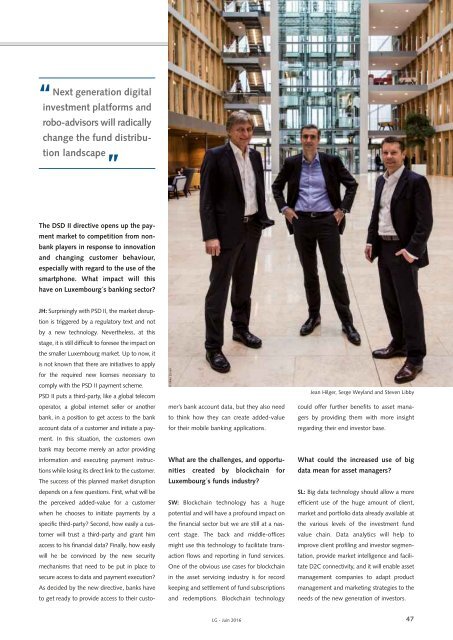You also want an ePaper? Increase the reach of your titles
YUMPU automatically turns print PDFs into web optimized ePapers that Google loves.
“<br />
Next generation digital<br />
investment platforms and<br />
robo-advisors will radically<br />
change the fund distribution<br />
landscape<br />
”<br />
The DSD II directive opens up the payment<br />
market to competition from nonbank<br />
players in response to innovation<br />
and changing customer behaviour,<br />
especially with regard to the use of the<br />
smartphone. What impact will this<br />
have on Luxembourg´s banking sector?<br />
©Mike Zenari<br />
JH: Surprisingly with PSD II, the market disruption<br />
is triggered by a regulatory text and not<br />
by a new technology. Nevertheless, at this<br />
stage, it is still difficult to foresee the impact on<br />
the smaller Luxembourg market. Up to now, it<br />
is not known that there are initiatives to apply<br />
for the required new licenses necessary to<br />
comply with the PSD II payment scheme.<br />
PSD II puts a third-party, like a global telecom<br />
operator, aglobal internet seller or another<br />
bank, in a position to get access to the bank<br />
account data of a customer and initiate a payment.<br />
In this situation, the customers own<br />
bank may become merely an actor providing<br />
information and executing payment instructions<br />
while losing its direct link to the customer.<br />
The success of this planned market disruption<br />
depends on a few questions. First, what will be<br />
the perceived added-value for a customer<br />
when he chooses to initiate payments by a<br />
specific third-party? Second, how easily a customer<br />
will trust a third-party and grant him<br />
access to his financial data? Finally, how easily<br />
will he be convinced by the new security<br />
mechanisms that need to be put in place to<br />
secure access to data and payment execution?<br />
As decided by the new directive, banks have<br />
to get ready to provide access to their customer’s<br />
bank account data, but they also need<br />
to think how they can create added-value<br />
for their mobile banking applications.<br />
What are the challenges, and opportunities<br />
created by blockchain for<br />
Luxembourg´s funds industry?<br />
SW: Blockchain technology has a huge<br />
potential and will have a profound impact on<br />
the financial sector but we are still at a nascent<br />
stage. The back and middle-offices<br />
might use this technology to facilitate transaction<br />
flows and reporting in fund services.<br />
One of the obvious use cases for blockchain<br />
in the asset servicing industry is for record<br />
keeping and settlement of fund subscriptions<br />
and redemptions. Blockchain technology<br />
Jean Hilger, Serge Weyland and Steven Libby<br />
could offer further benefits to asset managers<br />
by providing them with more insight<br />
regarding their end investor base.<br />
What could the increased use of big<br />
data mean for asset managers?<br />
SL: Big data technology should allow a more<br />
efficient use of the huge amount of client,<br />
market and portfolio data already available at<br />
the various levels of the investment fund<br />
value chain. Data analytics will help to<br />
improve client profiling and investor segmentation,<br />
provide market intelligence and facilitate<br />
D2C connectivity, and it will enable asset<br />
management companies to adapt product<br />
management and marketing strategies to the<br />
needs of the new generation of investors.<br />
<strong>LG</strong> - Juin 2016<br />
47


















